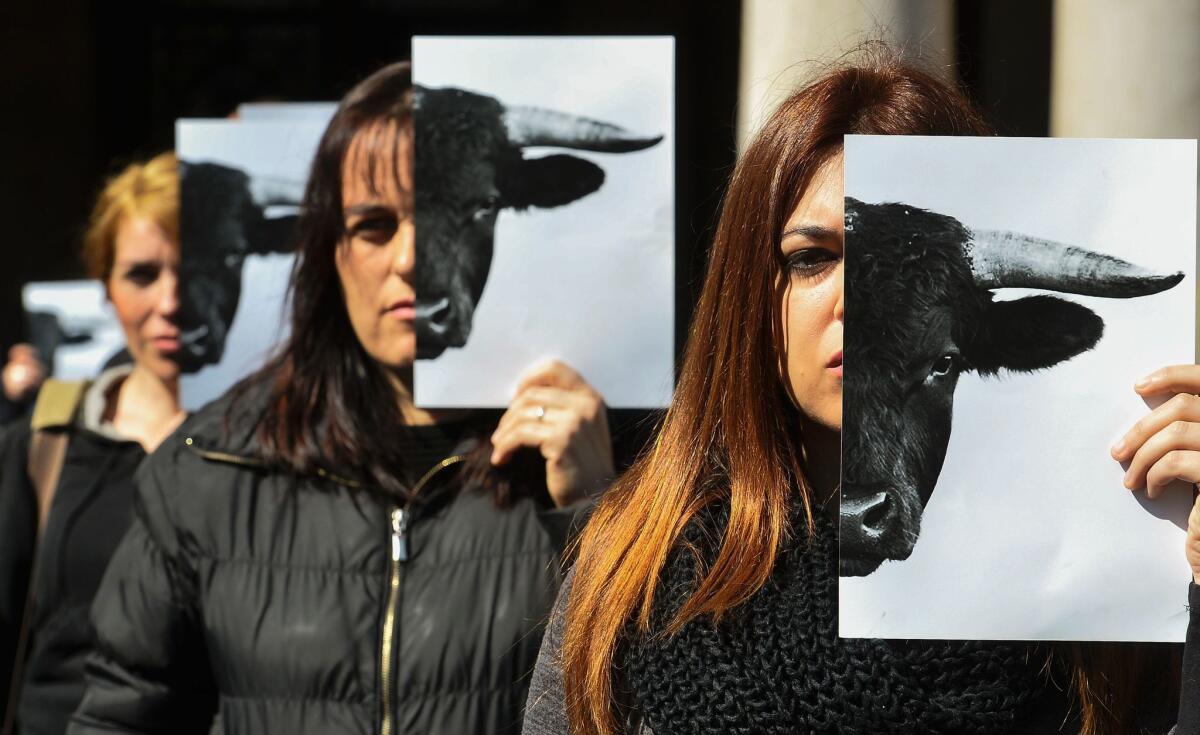Mexican state of Baja California balks, again, at banning bullfighting
Reporting from MEXICALI, Mexico — Fifteen minutes into a heated session on whether bullfighting should be banned in Baja California, legislator David Ruvalcaba proposed that the fate of the controversial but financially attractive sport needed further study.
Immediately the boos rang out, and half the crowded walked out.
For the third time this year, the Congress of the Mexican state of Baja California blinked in the face of banning a sport that has deep cultural roots in Mexico but is increasingly viewed as animal cruelty.
On Thursday, 12 legislators voted for the delay, eight opposed it and two abstained. And like that, bullfighting season will indeed begin Sunday in Tijuana.
Though they have repeatedly chosen not to vote on the issue, legislators here bristled at the notion, put forward by the bullfighting lobby, that the state does not have the power to regulate the sport.
“Of course we have the power to regulate the sport,” said legislator Juan Manuel Molina, though he allowed that that power carried the responsibility of exploring the ban further.
“It’s a matter of culture and a matter of belief, but it’s also a matter of humanity,” Molina said. “The spectacle is cruel.”
But Molina questioned how it was possibly fair to ban bullfighting while allowing other sports that claim Mexican heritage, such as cockfighting and the rodeo.

Members of the international animal rights group AnimaNaturalis protest against bullfighting in Valencia, Spain.
Animal rights groups have presented signature campaigns, celebrity endorsements and polls that purport to indicate overwhelming opposition to bullfighting as part of a public campaign against the sport, which has its roots in Spain and has been banned in some Latin American countries.
Bullfighting is increasingly unpopular in Mexico, according to the polling firm Parametria. In a 2015 poll, 73% of Mexican citizens supported a nationwide ban.
The Mexican states of Sonora and Coahuila, which border the U.S., have banned bullfighting, as has the southern state of Guerrero. But the sport remains popular in the capital, Mexico City, where the Plaza de Toros Mexico seats 48,000 spectators, the largest bull ring in the world.
On Sunday in Tijuana, the largest city in Baja California, the event will feature a rejoneador, a bullfighter on horseback, for the first bullfight of the season.
Built next to the sea and nearly adjacent to the border wall that separates it from California, the Tijuana bullfight ring is designed to appeal to Americans, even extending special offers to San Diego tourists: For a minimum of $200, guests will be whisked to the grounds of a winery on Saturday for a “Toros and Vino Event” that will feature two hours of private bullfights and a return trip across the border before the main event on Sunday.
If the ban is successful, the nearest bull ring near the Southwest border would be Chihuahua’s La Esperanza.
Supporters of bullfighting say the proposed ban would be a financial blow to Tijuana and bull ranches elsewhere in the state. Proponents argue that the sport creates 500 jobs and generates $11 billion in revenue each season, though legislative president Rodolfo Olimpo Hernandez Bojorquez said the bullfighting lobby “somewhat exaggerated the amount.”
A group in Spain has taken the heritage argument further, seeking a United Nations Educational, Scientific and Cultural Organization (UNESCO) declaration that bullfighting is a sport important to the nation’s history and deserving of protected status.
The animal rights groups that have organized repeated efforts to force the state Congress to ban bullfighting came away dejected.
“It is clear that there are so many interests with money who bought the vote of congressmen today,” said Ivan Marquez, an attorney with Lawyers for Animals, a group supporting the ban. “That really happened today. They are trying to deceive the people.”
Marquez said animal rights groups must maintain pressure on the legislators.
“Most of the people here in Baja California don’t want bullfighting in the state,” he said. “The [legislators] are mocking them.”
MORE FROM WORLD
Distilling mescal is a father-to-son tradition in Mexico
Stung by Trump’s attacks, Mexico names ambassador to U.S. who is expected to fight back
After massive ‘Panama Papers’ document leak, rich and powerful around the world deny wrongdoing
More to Read
Sign up for Essential California
The most important California stories and recommendations in your inbox every morning.
You may occasionally receive promotional content from the Los Angeles Times.










